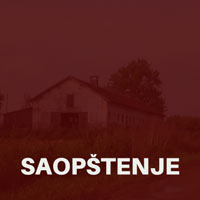Crime at Ovčara – 32 years of avoiding responsibility
 On the occasion of the 32nd anniversary of the crime at the farm at Ovčara near Vukovar, the Humanitarian Law Center (HLC) requests the institutions of Serbia to prosecute the officers of the former JNA who directly contributed to the commission of that crime, to give up supporting war criminals, to bring to a satisfactory conclusion the years-long search for the mortal remains of victims, and to help enable the creation of a memory culture dignifying victims.
On the occasion of the 32nd anniversary of the crime at the farm at Ovčara near Vukovar, the Humanitarian Law Center (HLC) requests the institutions of Serbia to prosecute the officers of the former JNA who directly contributed to the commission of that crime, to give up supporting war criminals, to bring to a satisfactory conclusion the years-long search for the mortal remains of victims, and to help enable the creation of a memory culture dignifying victims.
For the crimes at Ovčara, JNA Colonel Mile Mrkšić, Commander of the Guards Motorised Brigade (GMTBR) and Operation Group South, was sentenced to 20 years in prison before the International Criminal Tribunal for the former Yugoslavia, and JNA Major Veselin Šljivančanin, Head of the Security Organ of Operation Group South and GMTBR, to 10 years in prison. Only direct perpetrators were prosecuted before the Serbian judiciary for the murder of at least 200 prisoners of war at Ovčara. 24 members of the local Vukovar Territorial Defence (TO) and the volunteer unit “Leva Supoderica” were indicted, two of whom died, two received the status of protected witness, nine were finally acquitted and 11 were finally sentenced to prison sentences ranging from two to twenty years.
Despite the verdict, Veselin Šljivančanin is today a member of the Main Board of the ruling Serbian Progressive Party and a frequent media interlocutor, featuring as an analyst. In a letter dated April 8 of this year, Šljivančanin claims that the verdict against him “conclusively states that I and the soldiers under my command did not commit crimes”, thus manipulating the facts and omitting that the verdict established that he, in neglect of his responsibility for their safety, did nothing to stop the beating of prisoners of war at Ovčara, and did not give adequate orders to the military police regarding their security.
Instead of publicly supporting the perpetrators of war crimes, the state officials and institutions of Serbia are obliged to give their attention to the victims of the crimes at Ovčara and publicly express their respect towards the victims and their families. The initial step would be to mark the locations in Serbia where there were camps for the civilians and members of Croatian forces captured during the siege and after the fall of Vukovar, and to participate in the commemorative gatherings that have been held in Serbia for 32 years by non-governmental organisations.
The Humanitarian Law Center emphasises that in order to search for mortal remains effectively, it is necessary to open the archives of the JNA and to collect information from members of the army, volunteer formations and other persons who were familiar with the events at Ovčara and whose knowledge may indicate the places where the mortal remains of the victims are hidden.
After the pronouncement of the judgement in the case, which was conducted in Serbia, the HLC filed lawsuits on behalf of the families of those killed at Ovčara for the damages that occurred owing to the death of a close person. The HLC represented the victims during several years of proceedings. The eleven proceedings were concluded in favour of the claimants, who exercised their right to compensation for damages. Thus, the state of Serbia formally admitted its responsibility for the crime at Ovčara. The Humanitarian Law Center therefore believes that there are no obstacles to decisive procedures for the purpose of establishing full responsibility for the crime at Ovčara, finding the missing persons and supporting the victims.
Facts
Immediately after the fall of Vukovar to the JNA on November 18, 1991, on November 20 JNA members took the injured, the ill, civilians and members of the Croatian Armed Forces from Vukovar Hospital, and detained them in the hangars at the Ovčara pig farm, about five kilometres southeast of Vukovar. From the moment the captives were brought to Ovčara, members of the Vukovar TO and the “Leva Supoderica” volunteer unit beat, humiliated and otherwise abused the detained Croats, in the presence of members of the JNA Military Police. In the evening, the members of the JNA withdrew from Ovčara following the orders of Colonel Mile Mrkšić. Members of the Vukovar TO and the “Leva Supoderica” volunteer unit took detainees out of the hangar during the night between November 20 and 21, 1991, and led them in groups of 10 to 20 people towards Grabovo. At that location, and facing a previously prepared mass grave, they were shot. At Ovčara, alongside wounded members of the Croatian armed forces, civilians, women and children were also killed: Ružica Markobašić (32), who was in the late pregnancy at the time, Janja Podhorski (60), Dragutin Balog (17), Igor Kačić (16) and Tomislav Baumgertner (17).
200 bodies were exhumed from the mass grave at the Grabovo site, from which 193 victims were identified. The mortal remains of seventeen other victims were found in surrounding graves, whilst the remains of other victims are still the object of search.
Sources
Case: Mrkšić et al., ICTY
Case: Ovčara (Miroljub Vujović et al.)
Case: Ovčara IV (Damir Sireta)
Case: Ovčara V (Petar Ćirić)
Dossier: “Camps for Croats in Serbia”
Digital narrative: “Camps for Croats in Serbia”
Video: “Camps for Croats in Serbia”






